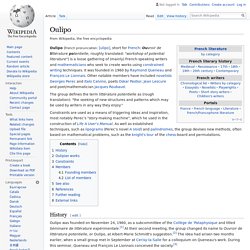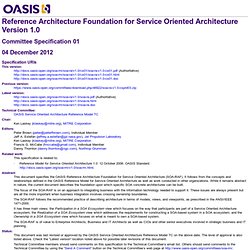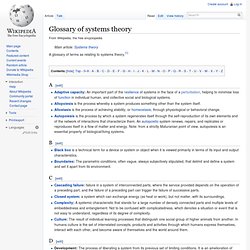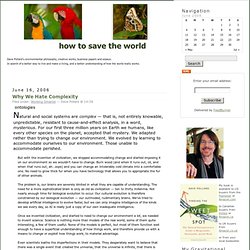

Oulipo. Oulipo (French pronunciation: [ulipo], short for French: Ouvroir de littérature potentielle; roughly translated: "workshop of potential literature") is a loose gathering of (mainly) French-speaking writers and mathematicians who seek to create works using constrained writing techniques.

It was founded in 1960 by Raymond Queneau and François Le Lionnais. Other notable members have included novelists Georges Perec and Italo Calvino, poets Oskar Pastior, Jean Lescure and poet/mathematician Jacques Roubaud. The group defines the term littérature potentielle as (rough translation): "the seeking of new structures and patterns which may be used by writers in any way they enjoy. " Constraints are used as a means of triggering ideas and inspiration, most notably Perec's "story-making machine", which he used in the construction of Life A User's Manual.
History[edit] During the subsequent decade, Oulipo (as it was commonly known) was only rarely visible as a group. Oulipian works[edit] Snowball. Reference Architecture Foundation for Service Oriented Architecture Version 1.0. Service Oriented Architecture (SOA) is an architectural paradigm that has gained significant attention within the information technology (IT) and business communities.

The SOA ecosystem described in this document bridges the area between business and IT. It is neither wholly IT nor wholly business, but is of both worlds. Neither business nor IT completely own, govern and manage this SOA ecosystem. Both sets of concerns must be accommodated for the SOA ecosystem to fulfill its purposes.[1] The OASIS Reference Model for SOA [SOA-RM] provides a common language for understanding the important features of SOA but does not address the issues involved in constructing, using or owning a SOA-based system. The intended audiences of this document and expected benefits to be realized include non-exhaustively: 1.1 Context for Reference Architecture for SOA 1.1.1 What is a Reference Architecture? 1.1.2 What is this Reference Architecture? 1.1.3 Relationship to the OASIS Reference Model for SOA. What is Systems Theory? What are Cybernetics and Systems Science?
Manuel Lima on the Power of Knowledge Networks in the Age of Infinite Connectivity. Glossary of systems theory. A glossary of terms as relating to systems theory.[1] A[edit] B[edit] C[edit] Cascading failure: failure in a system of interconnected parts, where the service provided depends on the operation of a preceding part, and the failure of a preceding part can trigger the failure of successive parts.Closed system: a system which can exchange energy (as heat or work), but not matter, with its surroundings.Complexity: A systemic characteristic that stands for a large number of densely connected parts and multiple levels of embeddedness and entanglement.

Not to be confused with complicatedness, which denotes a situation or event that is not easy to understand, regardless of its degree of complexity.Culture: The result of individual learning processes that distinguish one social group of higher animals from another. D[edit] Development: The process of liberating a system from its previous set of limiting conditions. E[edit] F[edit] H[edit] I[edit] L[edit] Global Theories. Complex Systems. Why we hate Complexity. Natural and social systems are complex — that is, not entirely knowable, unpredictable, resistant to cause-and-effect analysis, in a word, mysterious.

For our first three million years on Earth we humans, like every other species on the planet, accepted that mystery. We adapted rather than trying to change our environment. We evolved by learning to accommodate ourselves to our environment. Those unable to accommodate perished. But with the invention of civilization, we stopped accommodating change and started imposing it on our environment so we wouldn’t have to change. The problem is, our brains are severely limited in what they are capable of understanding.
Once we invented civilization, and started to need to change our environment a lot, we needed to invent science. Even scientists loathe the imperfections in their models. One of the principles that stresses scientists, mathematicians, philosophers and theologists the most is the concept of infinity. Why?